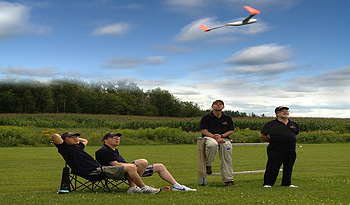EnergyOr Technologies Inc., a developer of advanced proton exchange membrane (PEM) fuel cell systems, recently demonstrated a long endurance flight of more than 10 hours with its fuel cell powered, operational unmanned aircraft.
The aircraft, FAUCON H2, complete with integrated avionics, executed a predetermined flight plan for 10 hours and 4 minutes, then landed autonomously just after sunset on Friday, August 12th, 2011 in Drummondville, Quebec, Canada.
The integrated hybrid UAS propulsion system was designed to take full advantage of fuel cells for their high energy density, and lithium polymer (LiPo) batteries to provide short bursts of power during take- off, climb and severe weather conditions. The result is that UAVs powered by EnergyOr’s line of EPOD fuel cell systems have a flight endurance that is up to four times longer than those powered by rechargeable LiPo batteries.
FAUCON H2 is one of the first UAs platforms to be designed specifically around the fuel cell which allowed the entire flight system to be optimized, resulting in very high system level efficiencies for both the UAS airframe and fuel cell system. It has a wing span of 3 meters, length of 1.2 meters, total mass of 9 kg (including representative payload mass of 1 kg) and a cruise speed between 65 km/h and 100 km/h.
“EnergyOr hhas again demonstrated its advanced fuel cell technology and confirmed its robustness, efficiency and reliability”, stated Michel Bitton President and CEO of EnergyOr. “What makes this an even greater achievement is that FAUCON H2 is not an experimental aircraft built just for long endurance. It is a versatile, rugged and practical operational UAS.”
EnergyOr recently developed the EO-310-XLE which is its latest generation of advanced fuel cell system technology. This lightweight and rugged UAV propulsion system is similar to EnergyOr’s other EPOD products, the EO-210-LE and EO-210-XLE, but provides 50% additional power with effectively the same size and weight. It has been designed specifically to deliver extended flight endurance at high altitude, high ambient temperatures, and under the most demanding of weather conditions. EnergyOr is also investigating fuel cell systems for 20 kg and 65 kg UAS.
“In conjunction with its development partners, EnergyOr will now move forward to commercialise its advanced line of fuel cell products,” said Michel Bitton.
Small, electrical UAS are a growing segment of the unmanned aircraft market and are designed to operate in many diverse environments: military applications, police surveillance, border patrol, inspection of remote power lines and pipelines, traffic surveillance, emergency and disaster monitoring, search and rescue, agricultural applications and aerial photography, to name a few.
Source: Press Release

